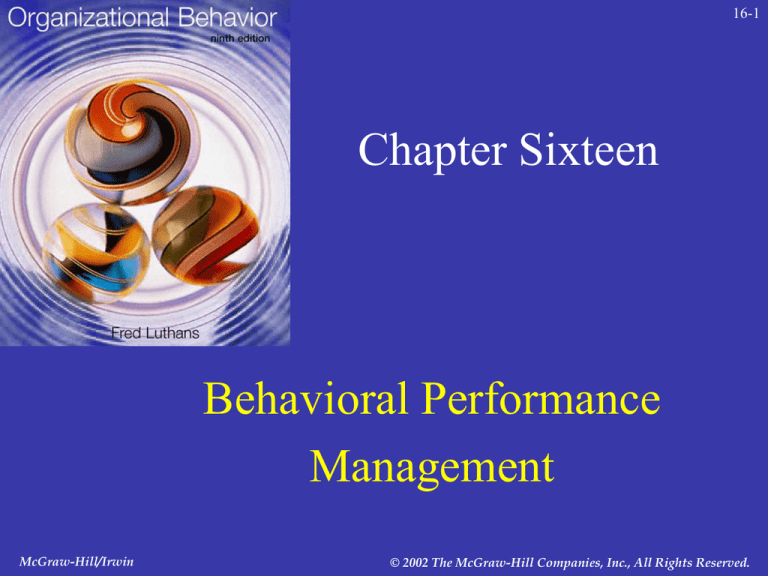
16-1
Chapter Sixteen
Behavioral Performance
Management
McGraw-Hill/Irwin
© 2002 The McGraw-Hill Companies, Inc., All Rights Reserved.
16-2
Learning Objectives
• Define the theoretical processes of learning:
behavioristic, cognitive, and social
• Discuss the principle of reinforcement, with special
attention given to the law of effect, positive and negative
reinforcers, and punishment
• Analyze organizational reward systems, emphasizing
both monetary and nonfinancial rewards
• Present the steps and results of behavioral management
McGraw-Hill/Irwin
© 2002 The McGraw-Hill Companies, Inc., All Rights Reserved.
Examples Of Classical And Operant Conditioning
16-3
Classical Conditioning
(R)
Response
(S)
Stimulus
is stuck by a pin
is topped below the kneecap
The individual:
is shocked by an electric current
is surprised by a loud sound
flinches
flexes lower leg
jumps/screams
jumps/screams
Operant Conditioning
(R)
Response
(S)
Stimulus
works
talks to others
The individual:
enters a restaurant
increases productivity
McGraw-Hill/Irwin
is paid
meets more people
obtains food
receives merit pay
© 2002 The McGraw-Hill Companies, Inc., All Rights Reserved.
Summary Of The Operational Definitions Of
Positive And Negative Reinforcement And Punishment
Consequence
of
Contingent
Application
Reward
(something desirable)
POSITIVE
REINFORCEMENT
Behavior increases
Withdrawal
McGraw-Hill/Irwin
PUNISHMENT
Behavior Decreases
16-4
Noxious stimuli
(something aversive
and undesirable)
PUNISHMENT
Behavior Decreases
NEGATIVE
REINFORCEMENT
Behavior increases
© 2002 The McGraw-Hill Companies, Inc., All Rights Reserved.
Chronological Development Of Conceptual
Foundation For O.B. Mod.
Approximate Time
1950
1900
Pavlov
Classical
Conditioning
1975
16-5
1977
Watson
Behaviorism
Skinner
Operant
Conditioning
Thorndike
Luthans &
Kreitner
Initial O.B. Mod.
Approach
Bandura
Social
Learning
Theory
Law of Effect
McGraw-Hill/Irwin
© 2002 The McGraw-Hill Companies, Inc., All Rights Reserved.
Chronological Development Of Conceptual
Foundation For O.B. Mod. (cont.)
1977
Bandura
Social
Learning
Theory
McGraw-Hill/Irwin
Approximate Time
1985
1986
Luthans and
Kreitner
O.B. Mod.
And Beyond
Bandura
Social
Cognitive
Theory
16-6
Present
Luthans and
Stajkovic
Full, Current
O.B. Mod.
Model
© 2002 The McGraw-Hill Companies, Inc., All Rights Reserved.
Percentage Performance Improvement According
To Different Types Of O.B. Mod. Reinforcers
Type of
Organization
Overall
Effect
Manufacturing
Service
33%
13%
Performance
Social
Monetary Feedback Attn/Recog.
(I)
(II)
(III)
39%
14%
41%
6%
(no studies)
15%
Simultaneous
Type of
application
Organization of I & II
Simultaneous
application
of II & III
Simultaneous
application of
I, II, & III
Manufacturing (no studies)
Service
30%
41%
30%
44%
9%
McGraw-Hill/Irwin
16-7
© 2002 The McGraw-Hill Companies, Inc., All Rights Reserved.





